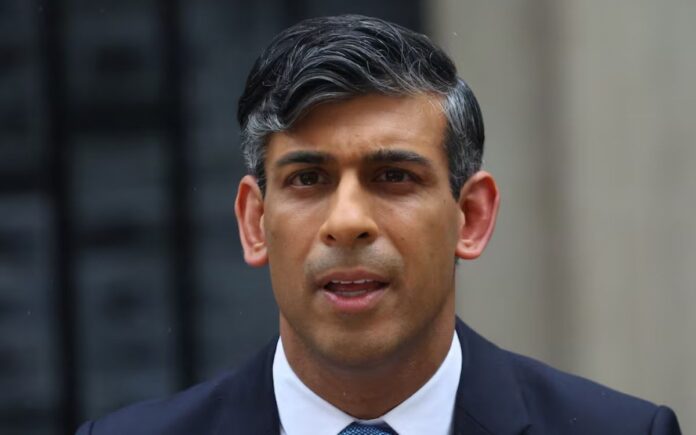London: British Prime Minister Rishi Sunak has called a national election for July 4, giving Britons the opportunity to choose their future. The election comes after 14 years of Conservative rule, with Sunak’s party widely expected to lose to the opposition Labour Party.
Standing outside his Downing Street office in pouring rain, Sunak, 44, announced the election date, ending months of speculation. This early election call is a risky move with his party significantly trailing Labour in opinion polls. Almost shouting to be heard over an anthem associated with the Labour Party played by protesters, Sunak highlighted his achievements both as Prime Minister and former Finance Minister.
“Now is the moment for Britain to choose its future,” he declared, framing the choice as one between stability under his leadership and uncertainty with Labour leader Keir Starmer. “Over the next few weeks, I will fight for every vote, I will earn your trust, and I will prove to you that only a Conservative government led by me will not put our hard-earned economic stability at risk.”
In a pointed attack on Labour, Sunak accused Starmer of always taking the “easy way out” and lacking a clear plan. “As a result, the future can only be uncertain with them,” he said.
Sunak enters this election significantly behind Labour in the polls and somewhat isolated within his party, relying heavily on a small team of advisers. Despite this, he appears to have timed the election call to leverage recent economic improvements, such as falling inflation and the fastest economic growth in nearly three years.
Having taken office less than two years ago, Sunak has struggled to clearly define his leadership. He has expressed frustration that his successes have not been fully recognized.
Campaign Strategies
Both parties have already begun their campaigns, focusing heavily on economic and defense issues. Sunak and his government have accused Labour of planning to increase taxes and lacking a comprehensive plan, which they argue would make Britain vulnerable in an increasingly dangerous world. Labour has countered, blaming the Conservatives for 14 years of economic mismanagement and instability, which they say has left people worse off.
If Labour wins, Britain will see its sixth prime minister in eight years, a level of political turnover not seen since the 1830s. Labour leader Keir Starmer’s spokesperson stated, “We are fully ready to go whenever the prime minister calls an election. We have a fully organized and operational campaign ready to go and we think the country is crying out for a general election.”
Starmer launched Labour’s campaign last week, pledging to “rebuild Britain” and outlining initial steps the party would take if elected. Despite Labour’s strong lead in the polls, some officials worry their advantage is not as secure as it seems, with many voters still undecided.
Sunak might be hoping to exploit this uncertainty and disrupt Labour’s preparations, as they have yet to finalize their parliamentary candidate selections. Additionally, Sunak is banking on recent economic gains and the potential commencement of his controversial immigration plan to send illegal asylum seekers to Rwanda, scheduled to start on June 24, to bolster his party’s standing.
While some Conservatives have welcomed the election call, not all are pleased. “Death wish 2024,” remarked one Conservative lawmaker anonymously.



